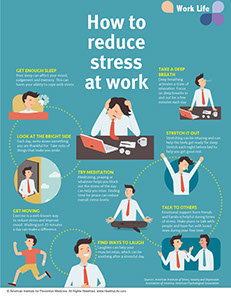SYMPTOM CHECKER
CONDITIONS
Male
Female
Child
Arm, Hand & Shoulder Concerns
Legs & Feet Concerns
Dental & Mouth Concerns
Ear & Nose
Eye Conditions
Head Conditions
Arm, Hand & Shoulder Concerns
Legs & Feet Concerns
Front
Back
Arm, Hand & Shoulder Concerns
Dental & Mouth Concerns
Ear & Nose
Eye Conditions
Head Conditions
Arm, Hand & Shoulder Concerns
Dental & Mouth Concerns
Ear & Nose
Eye Conditions
Head Conditions
Front
Back
Arm, Hand & Shoulder Concerns
Neck Links
Head & Neck Concerns
Arm, Hand & Shoulder Concerns
Neck Links
Head & Neck Concerns
Front
Back
Online Clinic
Wise Healthcare
How to reduce stress at work
Print on Demand
Get enough sleep: Poor sleep can affect your mood, judgement and memory. This can harm your ability to cope with stress.
Look at the bright side: Each day, write down something you are thankful for. Take note of things that make you smile.
Get moving: Exercise is a well-known way to reduce stress and improve mood. Walking just 20 minutes a day can make a difference.
Try meditation: Meditating, praying or whatever helps you block out the stress of the day can help you relax. Finding time for peace can reduce overall stress levels.
Find ways to laugh: Laughter can help your muscles relax, which can be soothing after a stressful day.
Take a deep breath: Deep breathing activates a state of relaxation. Focus on deep breaths in and out for a few minutes each day.
Stretch it out: Stretching can be relaxing and can help the body get ready for sleep. Stretch each night before bed to help you get good rest.
Talk to others: Emotional support from friends and family is helpful during times of stress. Make plans to talk with people and have fun with loved ones during your free time.
Sources: American Institute of Stress, Anxiety and Depression Association of America, American Psychological Association
This website is not meant to substitute for expert medical advice or treatment. Follow your doctor’s or health care provider’s advice if it differs from what is given in this guide.
The American Institute for Preventive Medicine (AIPM) is not responsible for the availability or content of external sites, nor does AIPM endorse them. Also, it is the responsibility of the user to examine the copyright and licensing restrictions of external pages and to secure all necessary permission.
The content on this website is proprietary. You may not modify, copy, reproduce, republish, upload, post, transmit, or distribute, in any manner, the material on the website without the written permission of AIPM.
2021 © American Institute for Preventive Medicine - All Rights Reserved. Disclaimer | www.HealthyLife.com
















































